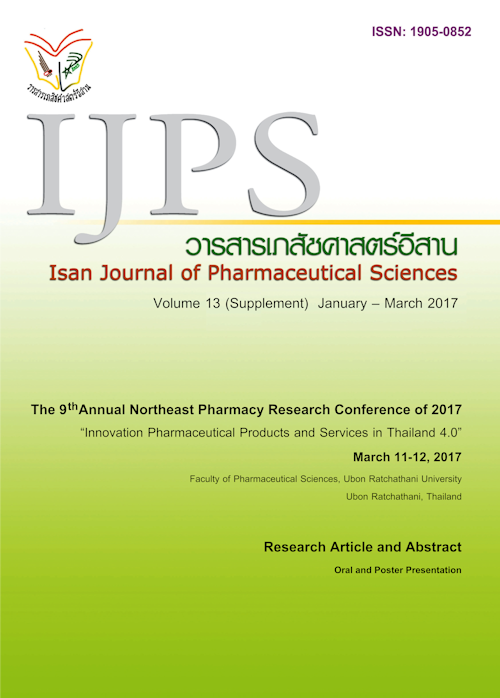Problems on regulation of radio commercial of food and drugs by regional government officials
Main Article Content
Abstract
Introduction: Illegal radio commercials of food and drugs (F&D) have long been a serious problem in Thailand. Even with the strictly control by the government, such illegal commercial can be commonly detected. We had conducted this research to investigate how the regional government officials deal with such unlawful F&D commercialization, i.e. what would impede such regulation. Methods: This qualitative research collected data by in-depth interview with 14 pharmacists working at Provincial Public Health Offices and Community Hospitals. Data were analyzed by content analysis. Results: The processes for regulation of illegal F&D radio commercials consist of:1) controlling and collaborative measures with the traders and entrepreneurs; 2) monitoring and deterrence measures; 3) law enforcement measures; and 4) collaborative measures with the whole network. Operation of these processes varies from province to province. The law enforcement measures will be applied when other processes become ineffective or when the complaint was failed. Problems affecting the operational efficiency are: 1) working environment such as 1.1) holistic management,1.2) collaboration with the National Broadcasting and Telecommunications Commission, 1.3) policies of the provincial executives, 1.4) operation of other province’s Office of the Provincial Health, 1.5) traders and entrepreneurs, 1.6) budget and equipment, 1.7) limitation of the district official and 1.8) consumer knowledge; 2) internal factors of the government officials such as 2.1) lack of skills, 2.2) lack of problem awareness, 2.3) judgement and implementation of the processes, 2.4) burden/workload, 2.5) consequence of the operation; 3) limitation on legal issues such as 3.1) inconsistence of law-enforcement units, 3.2) gap in law, 3.3) legal authorities and 3.4) unfavorable law enforcement. Conclusion: This research portrays that the officers must take several measures to regulate unlawful radio F&D commercializations, which have problems and difficulties in management. All related parties can realize more to the present problem and use this data as a check list to find the appropriate solutions for better efficiency of problem solving.
Article Details
In the case that some parts are used by others The author must Confirm that obtaining permission to use some of the original authors. And must attach evidence That the permission has been included
References
Bureau of Inspection and evaluation, Inspection and evaluation report on ministry of public health in 2016. [online] [cited 2016 Dec 18]. Available from: http://203.157.240.30/bie/home
Center for Surveillance and Compliant Processing, Food and Drug Administration. Report on compliant filed in 2015 [online] [cited 2015 Apr 18]. Available from: http://newsser.fda.moph.go.th/hpsc/frontend/theme/view_info_operation.php?Submit=Clear&ID_Info_Operation=00000026
Kanchanachitra C, Podhisita C, Archavanitku K, Chamchan C, Siriratmongkol K, Tipsuk P, et al. Thaihealth 2011: HIA: A mechanism for Healthy Public Policy. Nakhon Pathom: Institute for Population and Social Research, Mahidol University; 2011.
Namjuck T, Plodthong P. Legel Measures for Consumer Protection for Food Advertising Campaign. Executive Journal, 2014, 1: 51-59.
National Innovation Agency(2010). Unfold of Illegal Advertising of Health Products in the Era of the National Council for Peace and Order (NCPO) [online] [citied 2017 Jan 20] Available from: http://www.nia.or.th/innolinks/page.php?issue=201403§ion=6
Rujirayunyong T. Situation of Illegal Advertising of Health Products among Local Radios in Lopburi in the Era of the National Council for Peace and Order (NCPO). TJPP 2015, 2: 187-199.
Suwanmanee O, Lerkiatbundit S. Illegal advertising of products classified as drugs by law among localradios. TJPP 2011, 3: 41-55.


